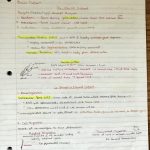In the transition from high school to college, I had to tweak my study habits to find what brought me the most academic success at the collegiate level. I kept some of the same strategies that I used in high school, while also adding in new ones I thought would be helpful (and they were… by a lot!). As a Neuroscience major who has gotten A’s on nearly all my exams thus far in the semester, I feel that I have figured out what strategies work best for me. Here you’ll find what I consider to be the most helpful strategies for myself, and while everyone learns differently, I hope that you’ll find some of them to be helpful too.
1. Plan out your schedule using a planner
While I use Microsoft Outlook to manage most of my monthly plans, nothing is as efficient as a physical planner for completing daily tasks. This is probably a personal preference, but I feel that having a planner in which I can write my agenda for the day and visually see it next to my work helps me stay more on-task. If done the right way, a planner can be a powerful organizational tool to tackle procrastination. In the past, I would only write down what homework I planned on completing for the day. But recently I’ve learned to make the most out of it, writing out not only what I plan on getting done but also at what times and to what extent. Since I’ve begun doing this, I’ve seen an increase in my productivity and focus. And my best advice: find a planner that makes you want to use it — one that you feel is the right fit for you. Don’t be boring and use a spiral notebook… spice it up!
2. READ THE TEXTBOOK
As much as I wish it weren’t true, textbooks are your best friend. Teachers recommend you read them for a reason. However, whether they are worth the pain of dedicating hours to reading depends on the class. In my experience, I have found them to be helpful for content-heavy classes in which I am required to memorize a lot of information. While what you read may seem redundant to what is taught in the lecture, it oftentimes helps clarify what is being taught and makes concepts brought up in class simpler to understand. This will put you at an advantage compared to other students when it comes time to take the exam.
Reading the textbook is one thing, but you must make sure you are actively reading to truly understand the material. I do this by having a multi-step note-taking process (that makes it sound scarier than it actually is). Before writing anything down, I read a particular section or paragraph and highlight any key ideas. After doing this, I see what I retained and write it down in the form of short notes before revisiting the highlighted parts and taking note of any extra information that should be written down. Make diagrams when necessary, and use headlines and visual aids to group notes of the same concept together.
3. Play the teacher’s role
Nothing helps you to check your understanding better than explaining concepts to another person. Studies have also shown that those who study by teaching tend to perform better and develop long-term retention of the material. By speaking out loud what you know and making it comprehensible to another person, you are identifying key concepts as well as what you may still need to work on. Even if there is no one for you to talk to, talking out loud and “teaching” yourself has been proven to be an effective study method.
4. Make a study guide for classes that rely on memorization
If I had to put all my bets on one studying method, it would be this one. I swear by study guides, especially when it comes to my STEM classes. Why do I think study guides are so helpful? For one, they help simplify and organize dense lecture content, so that if there are hundreds of slides to memorize, the material can be condensed down to just the key ideas in one spot of your study guide. In addition to selecting information that is significant enough to be written down, I also like to use colored pens to divide sections according to different concepts. While it may seem like a lot of work, all this helps you to visually organize the information better, which helps with recall later on. Plus, I find it more fun than rereading notes over and over again!
5. Give yourself a break every 40 minutes to an hour
As my neuroscience professor once said, classes shouldn’t last more than an hour because it is difficult for the human brain to remain attentive for so long. We all have heard before that taking breaks while studying is important, but how often do you really take them? Do you tend to tend to lose track of time and push through hours of work or do you find yourself on your phone after 15 minutes? Reflecting on the amount of time you study may help you improve your habits so that you can study more effectively. Dedicate a set amount of time to focusing on your work, knowing that once you finish, you will have a break. Doing so can help prevent procrastination but also allow your mind to refresh so that you absorb the most information you can.
6. Use resources beyond the classroom
While your teacher may have provided you with a study guide, practice problems, and such, it’s important to remember that the Internet gives you access to tons of other resources. Students put out Quizlets, Kahoots, notes of their own, and many other resources, oftentimes specific to the course you are taking (just look up the name of your course and what type of resource you are looking for). A website I’ve referred a lot to when studying for exams is Studocu.com, where students put out notes and review material for different courses. If you’re confused about a concept, one of the easiest ways to understand it is by looking up explanations. If you need help structuring your essay, you could refer to AI generators like ChatGPT (not to write your essay for you but to give you suggestions on how you could improve it). There’s tons of information out there at your disposal, use them!
7. Treat yourself and get in the grind.
If you’re lacking motivation to stay focused, one of the things I find the most helpful is rewarding myself for studying. We all need that little extra push to work hard sometimes, and having something to look forward to is a great way to motivate you. This could take the form of a coffee (the classic studying experience), having a study sesh with a friend, or doing something enjoyable once you’re done.




